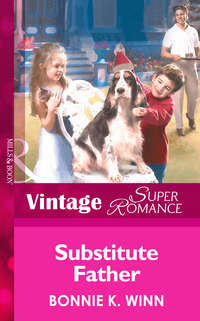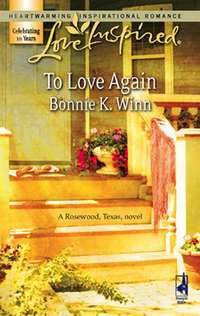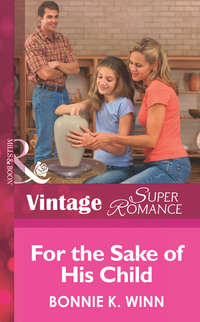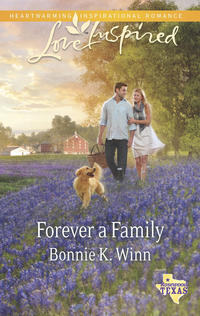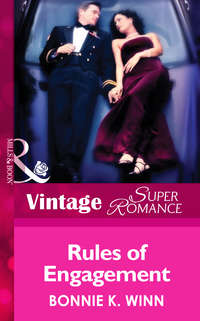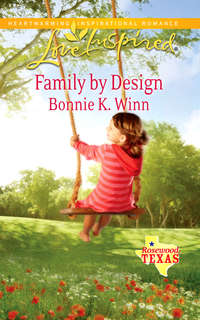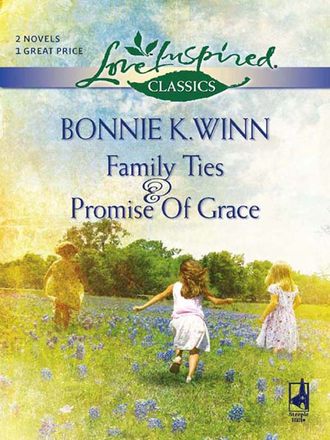
Полная версия
Family Ties: Family Ties / Promise Of Grace
“She loved them so much,” Cindy murmured. “They have to know that.”
“They’ll see it in you,” Flynn told her, the response surprising both of them.
Cindy’s chin lifted, her eyes meeting his. “They will?”
“They’ve held an attachment to you that’s remarkable, considering how young they are, how seldom you used to see them. I can’t help but think it’s your connection to their mother.”
Slowly, almost painfully, Cindy nodded. “There was a time when Julia and I were so close, we used to imagine we were twins.”
Flynn frowned, the words giving him weighty pause. “You never seemed much alike to me.”
A smile rose from the pain on her face. “Probably not to anyone else. We don’t look anything alike—I’m the only renegade redhead besides my grandmother. And I’m as boisterous as Julia was refined, but it was something deeper. A connection in our souls. And that only strengthened after our parents died.”
“But you didn’t visit all that often. And you moved away from Houston,” he pointed out, wondering yet again about his elusive sister-in-law, remembering how he’d shut out any thoughts of her once Julia was his.
Cindy turned, her gaze fastening on the gently winding road that was nearly obscured by the great tracts of irrepressible wild grass. Her open expression didn’t slam shut; rather it sidled away so subtly, he wondered if he imagined the change.
“People grow up and away,” she finally answered. “Distance need not be more than a physical impediment. I don’t think it was for us.”
“She missed you,” Flynn admitted. “Especially since you were the last of your family.”
Pain vaulted past subtlety, ravishing her face. “I had no idea.”
“Don’t take the words to heart. But you should know how she felt, how she always valued your relationship.” He couldn’t admit that Cindy’s absence from their lives had been a relief to him. Flynn hadn’t needed or wanted reminders of what she represented, of what he had tried to escape every day since childhood.
Despite his reassurance, only a sparse bit of comfort mixed with the trepidation painting her face. “I should have visited more. I shouldn’t have let…”
“What?” he asked, when her words trailed away.
She brushed a tear from the corner of her eye, then shook her head. “Nothing.”
“Did you have an argument?” Flynn asked, wondering how he could have not known that.
“No.” For a moment her face brightened. “Julia wouldn’t have allowed it. Besides, she was my other half. Surely you’ve noticed that we were complete opposites?”
The fact that Cindy was her sister’s opposite in every way was still Cindy’s biggest downfall in his opinion, the reason he’d chosen Julia over her, yet he nodded.
“We seemed to complete what the other lacked. And I feel like my other half’s gone forever.” Suddenly she looked horrified. “I don’t know what’s wrong with me. I keep putting both feet in my mouth and tromping around like they’re clad in combat boots. I’m so sorry. You truly have lost your other half.”
“No need to apologize. We both lost her.” His gaze moved to include the girls, who were tossing wildflowers skyward, then giggling madly as the blossoms fell down upon them. “We all did.”
“Children are so resilient,” Cindy mused. “It’s one of the ways the Lord protects them.”
Flynn lifted his eyebrows but he didn’t respond, thinking it wasn’t worth arguing over. His own faith was long gone, and he still believed it wasn’t something Cindy would be spouting for long. “Hmm.”
But Cindy didn’t argue in defense. Instead, the expression in her eyes was so knowing and certain it defused any debate. At once, Flynn felt old defenses lock into place.
As his thoughts rumbled, he spotted the girls as they started running toward the road. Even though only a handful of cars had passed in the last hour, Flynn and Cindy both bolted after them. It didn’t take long to corral the children.
“All right, girls, you know better than to run toward the road,” Flynn began in a stern tone.
But the girls laughed as they jumped up and down, cutting off his reprimand.
Since where they stood was still plenty of distance from the street, Flynn tried not to overreact.
“Cows!” Alice hollered, pointing across the road.
Glancing up, Flynn saw a mild-mannered herd of dairy cattle munching on the grass. “So that was the attraction,” he muttered.
“You have to be wary of small-town dangers,” Cindy agreed in a serious tone. But the twinkle in her eyes gave her away.
“They do look pretty ferocious,” Flynn replied, seeing the cattle’s only movement was the swishing of hairy tails and the methodical chewing of cud.
A tiny giggle escaped even though Cindy was clearly trying to keep it under control. “We have some wild ice-cream socials here in town, too. Gotta be on your guard all the time.”
Flynn glanced down the empty road. “I can see that. There might even be a horse or two in the next pasture over.”
“Horsie!” Beth and Mandy repeated in delight.
“Cow!” Alice insisted.
“Just wait until a new movie comes to town.” Cindy couldn’t repress her grin. “The excitement’s enough to do you in.”
“I think for now the horses and cows will keep us entertained.”
Cindy’s expression was knowing and skeptical. “We’ll talk in six months when the biggest action in town is the fall carnival.”
“I haven’t been to a carnival since I was a kid.” The thought was unexpectedly warming. But Flynn knew what Cindy was driving at. Clearly she thought he would grow tired of small-town life, that Rosewood would lose its appeal. But everything else that had once held appeal for him was now gone. Yet instinctively he felt that the tiny town was right for him. Was it possible he’d been given another chance? Another place to call home?
Chapter Three
“I’m on to you guys,” Cindy told the girls with mock seriousness as she wiped one face, only to see another triplet smear granola cereal across her cheek.
They only giggled more.
Each of the girls was secured in a booster seat, bowls and spoons in the same vicinity, as they sat around the breakfast table with Cindy.
“Here you are,” Flynn greeted them. Awakening only moments earlier, he’d been startled to find all three girls gone from their beds. Passing Cindy’s room, which was next to the girls’, he could see it was empty, as well.
Cindy and his daughters glanced up at him in unison. The girls garbled out greetings mixed with cereal and juice, slurry versions of “Daddy.”
“Morning,” Cindy greeted him.
Flynn was unable to shake the frown from his face. “You didn’t have to do this.”
She shrugged easily. “No big deal. I was up, they got up. So we’re eating.”
“But they’re a lot of trouble to feed and—”
“Not really. Besides, it’s more fun than eating by myself with only the newspaper for company.”
“Oh.” Deflated, he wasn’t certain what to say. For the past year, despite a housekeeper, nannies and sitters, much of his daughters’ care had fallen on him. It was disconcerting to see how easily Cindy took over the chore. “They weren’t up this early the last few days.”
“Takes a while to get settled into a new place. And it’s possible I woke them when I got up.”
“I didn’t hear anything.”
“You’re two rooms over. Besides, like I said, it’s no big deal. Actually, it’s kind of fun.” Mandy decorated her golden, honey-blond hair that moment with a glob of cereal. Cindy laughed aloud as she reached for a damp towel. “For the most part, anyway.”
“I’m up. I can take over.”
“Why don’t you grab some coffee?” Cindy smoothed the towel gently over Mandy’s hair, removing most of the cereal. “No sense jumping in till you’re awake.” She stood just then, moving over to the refrigerator, drawing out a container of organic apple juice.
His mouth opened as he intended to tell her to back off, that these were his children, that he would feed them breakfast. She spun around, however, at that moment her face pulling into a tentative look of speculation. “You know, I may have to take you up on that offer. I got so caught up in the girls I forgot today is Tuesday, my Rainbow class day.”
Pottery, he guessed, or some similar sort of thing. She’d always been involved in one crazy project after another. Julia had reported on her sister’s escapades often enough. But that had only reinforced his opinion. Cindy was fun, reckless and totally without responsibility. He’d finally stopped listening to Julia’s tales, having learned enough about Cindy. He had grown up in a home where fun had been valued over stability and it had ruined all their lives. It was the reason he’d always remained detached from Cindy. Now she was offering him back the responsibility for the girls so she could run off to some mindless class. “Fine.”
She smiled. “I have a few minutes, though, if you’d like that coffee.”
His voice sounded stiff even to his own ears. “It’s not necessary. I have managed to feed them and drink my coffee for the past year.”
Her brows drew together. “Of course, but—”
The phone rang, cutting off her reply.
Flynn could only hear one end of the conversation, but he didn’t need to listen long to learn that it sounded as though she planned to meet half a dozen friends for the day’s outing.
“Fine, I’ll pick up Lisa and Heather on the way, too,” Cindy continued on the phone. She glanced at her watch. “But I’d better run.” She turned back to Flynn after clicking off the phone. “You sure you’re okay on your own? I could make some arrangements if—”
“No. I told you I didn’t want our staying here to interfere with your life.”
“It’s not. It’s just that today—”
“Go,” he replied shortly, sliding into the chair nestled between the girls.
Looking as though she wanted to continue what she was saying, instead Cindy nodded. “I’ll see you later, then.”
That was more like it, he thought to himself after she left the kitchen. He hadn’t asked for or wanted Cindy’s help. Turning back to the girls, he saw that they weren’t happy with her disappearance, though.
“Cinny,” they wailed in unison.
“Daddy’s here.” He comforted them.
“Cinny!” they continued demanding.
“Cereal?” he questioned, pushing a measure of enthusiasm into his voice, staring down at the unfamiliar granola, thinking it didn’t look very appetizing.
But when he glanced up, three minor storms had descended over their faces.
“It wasn’t my idea for her to leave,” he attempted.
Beth, always the loudest of the triplets, banged her spoon on the edge of the table. “Cinny!”
“Okay, time to settle down and eat your breakfast.”
Although they weren’t happy with the request, they eventually complied. Three sticky faces later, he was near the end of his patience. It was going to take forever to get the girls cleaned up, not to mention the damage they’d done to Cindy’s formerly spotless kitchen floor. It wasn’t how he’d anticipated the day, but there was no getting around the fact. He was going to be scraping up granola for at least part of the morning.
Cindy was tired. Her usually endless supply of energy was running low. It had started draining that morning when Flynn pulled his stiff, get-out-of-my-face act. She’d tried to repump, knowing the Rainbow children needed all she had to give. But his mood had intruded on hers the entire day—even though today had also been filled with rewards.
None of them was the large variety that impressed most people. Rather the small ones, like when Heather offered to share a toy. Not remarkable for most children. But then Heather wasn’t the average child. She’d lost her parents and younger brother in a car accident. Now, living with an aunt and uncle who didn’t really want her, she’d become hostile, desocialized. A few months earlier Cindy had convinced the child’s guardians to allow Heather to attend the Rainbow class.
The class had begun three years earlier with one lonesome little girl, Lana, the child of a single father who was desperate to round out his daughter’s life with the happiness she’d lost along with her mother. Cindy, full of love she’d yet to give anyone, lavished it on Lana, finally coaxing smiles, then laughter from her sad little face. Then another emotionally scarred child had come along. And another.
Katherine had encouraged Cindy when she’d suggested forming a group. And the Rainbow class was born. Children continued to join, all with a variety of needs, no two the same. Yet they came together in the Rainbow class, a healing, nurturing place.
Normally days spent with her “Rainbow” kids were ones of great satisfaction. But the nagging feelings she’d carried with her from the house had stolen some of that pleasure.
As she pulled into her driveway, Cindy couldn’t halt a jolt of apprehension. It wasn’t a simple emotion, but one tied in to her feelings for Flynn, his obvious dissatisfaction and the grand mess she’d made by inviting him to stay in her house.
For the first time since purchasing the winsome Victorian, she was reluctant to enter. Her throat caught—this, her place of refuge, was no longer a sanctuary. Forcing the dregs of her energy to respond, she pushed open the front door.
And entered chaos.
The triplets, who appeared to have dragged every toy in the house to the front hall and parlor, were running through both rooms as though flung like buckshot.
Paralyzed for a moment, she watched in stupefied fascination as Flynn entered the hall and tried to harness the girls.
He glanced up just then, all his earlier stiff resentment gone, replaced by a sheepish embarrassment. “It’s really not as bad as it looks.”
She placed her purse on the hall table. “That’s a relief.”
“Nothing’s broken—I put all the fragile stuff up high.” Cindy glanced at her assortment of antique scarves and shawls that normally hung from a brass rack near the door. Apparently the triplets had tugged them free. Now they were strung haphazardly over and across the rich marquetry floors. Sunlight from the second-story rotunda usually shone on the intricate pattern of oak, bird’s-eye maple and rare East Texas long leaf pine. Now, however, it was hardly visible under the mess.
“Things got a little out of control,” Flynn admitted.
“So I see.”
Flynn followed her gaze, releasing a low groan. “I didn’t realize they’d gotten into your scarves, as well. To be honest, I thought once I’d put the breakables out of reach, they’d be safe while I mopped the kitchen floor.”
Amazed, she stared at him. “Why did you feel you had to mop the floor? I just did it—”
“Breakfast,” he explained, the one word conveying paragraphs.
“Oh.”
He met her gaze. “I know I said I didn’t need any help, rather emphatically if I remember correctly. Truth is, back home we had a housekeeper. While she wasn’t their nanny, she kept all the messes and spills cleaned up. I never realized how difficult it would be to watch the girls and clean up their fallout.”
She felt a chuckle unexpectedly germinating and tried to suppress it. “Sometimes things aren’t as easy as they appear.”
He glanced around the nearly destroyed area. “I’d say that was an understatement. Unless you have a strong objection, I’d like to find a housekeeper as soon as possible.”
Cindy allowed a fraction of her smile to escape. “I don’t think that’s really necessary.”
“You want to live like this?”
“That’s not necessary, either.” She kept her tone mild, guessing the end of his rope was nearly frayed. “I often have four or five children here at one time. But it does take a little organization, some planning.”
He stared at her in disbelief.
“I do have a grasp on those concepts,” she told him wryly.
“Still—”
She held up one hand. “I’m really not accustomed to depending on others, especially in my own home. To be honest, it would seem like an intrusion. How about if we try it my way for, say, a week? If it doesn’t work, we’ll look into finding a housekeeper.”
“A week?”
She chuckled. “You sound about the girls’ age. It’s a week, not a year.”
“Maybe so. But the week I’m anticipating will seem like a year.”
Cindy bent down, retrieving a hand-beaded silk shawl that was the prize of her collection. “Look at it this way. Your stuff’s in storage so I’ve got the most to lose.”
“Point taken. I just hope you don’t regret your offer.”
Regret. It was her constant companion, a reminder she couldn’t shake with hurricane force winds. But having become an expert at disguising her feelings, she only smiled, edging toward the kitchen. “I’d better check things out, start on dinner.”
“The floor’s clean,” he responded.
She glanced at the wreckage in the parlor and hall and nodded. “Well, that’s one positive.”
“Don’t worry, Cindy. I’ll put things back to rights.”
She disappeared into the kitchen. It wasn’t possible, she knew. Even if the house was fashioned into Architectural Digest perfection, things could never be made right. Not while he held her heart in his hands, and didn’t even realize he controlled its very rhythm.
Dinner was spectacularly uneventful. Only a few spoonfuls of mashed peas landed on the floor, soon wiped clean. Flynn wasn’t certain just how Cindy had accomplished it, but control prevailed throughout the meal. But it wasn’t a disciplinary nightmare. To the contrary, the girls were happy, easy to handle.
Perhaps it was a woman thing, he mused. Julia had always had just the right touch with the girls, as well. But that wasn’t something he expected Cindy to share with her sister.
Bathtime was also competently and quickly accomplished. Soon, the girls were snuggled in their sleepers, tucked into their matching beds.
More than a bit amazed, Flynn studied Cindy as they reached the bottom of the stairwell. He wondered if she was part magician, making the care of the triplets seem effortless.
Having reassembled much of the parlor, he began gathering some of the scarves still strewn across the floor.
Cindy stooped down, as well, carefully picking up each ancient slip of fabric.
“These are really…different,” Flynn finally decided aloud.
“That doesn’t exactly sound like a compliment.”
He held up one sheer red scarf, threaded with gold, edged with long strands of dark fringe. “They suit you.”
Her smile was wry. “Again, I’m not sure that’s a compliment.”
Flynn paused, the scarf awkwardly filling his hands. “Look, I know we don’t see many things the same way.” He held up the exotic red silk. “But I don’t have any frame of reference for stuff like this.”
“Granted,” she replied, a touch of a sigh flavoring the solitary word. “Julia was always practical, unlike me. Cotton versus silk, that was us.”
He studied the weariness she couldn’t quite disguise. “We haven’t gotten off to the best start, have we?”
She shrugged. “It’s a big adjustment. You’re used to running things your way.”
“And you’re used to being on your own.”
Cindy lifted her face, new shadows deepening her obvious fatigue. “Yes. That I am.”
Flynn sighed. “I knew this was a bad idea. We’re messing up your life, your home.”
“I’m not a neat freak,” she replied after the barest pause. Then her eyes shifted away. “We knew going in this wasn’t an ideal situation, but if it helps the girls, I can manage. How about you?”
He fingered the soft, exotic scarf. “I’ll do whatever it takes to make the girls happy.”
“Then there’s no more to say,” she responded.
Flynn wanted to search her eyes, to see how Cindy really felt, but she stood, turning to the brass rack. He owed her an apology, but it was difficult to spit out. He’d spent the better part of his adult life making certain he had nothing else to be sorry for. And he doubted even his unsettling sister-in-law could change that.
Cindy chose to be especially quiet the following morning as she worked in the downstairs conservatory. Not wanting a repeat of Flynn’s displeasure, she’d tiptoed around her bedroom as she’d dressed, then slipped silently down the stairs, knowing how to avoid the creaks in the ancient steps.
Her night had been restless, filled with dreams caused by thoughts she couldn’t chase away. So she’d risen early to escape them, needing to lose herself in activity.
Picking up a box filled with old photos, she started to put it aside. Then she glanced at the picture on top. Settling the box on top of the table, she withdrew the photo. It had been taken years ago. Her parents, Julia and herself. They were on vacation at Disneyland. Julia and their mother both looked pretty, smiling gracefully. But Cindy and her father were wearing goofy hats and glasses, wide, silly grins covering their faces. She eased a thumb over the slick surface, remembering the good times, the pain of loss that had faded, but never disappeared.
Flynn coughed from the doorway.
Startled, Cindy dropped the photograph.
He entered, reaching down to pick it up before she could. “Nice picture.”
She nodded, not willing to delve into her unreconciled loss. “Kind of early in the morning for reminiscing, isn’t it?”
“I wasn’t actually. Just saw that picture and it brought back a lot of memories.”
He looked at it again. “You and Julia were on different wavelengths.”
Cindy swallowed the pain of that comment. “She was always more like Mother, refined, graceful, elegant.”
“And you were like your father?”
“I guess so. He was the adventurer—the one who wildcatted after the days of oil wildcatting were past. He liked to pursue the impossible.”
Flynn’s gaze shifted between Cindy and the picture. “I’m not like my mother, either.”
Never having heard much about his family, she wondered about them. “What was she like?”
His face closed. Tossing down the picture, he shrugged. “Just a mother.” Then he glanced at the newly cleared desk. “What are you doing in here?”
“Making a temporary office for you.”
His eyes swept over the newly arranged room. “You didn’t have to do this—”
“You’re beginning to sound like a broken record,” she interrupted. “You need a place to work in until you get the office space you want.”
“I’m hoping to get that set up soon.”
“Fine. I’ll need the room back after a while anyway. It’s one I use sometimes for one of my volunteer functions. And in the future it may be the permanent spot for the class.”
He frowned. “Then why go to so much trouble?”
This time she didn’t shift her gaze, instead meeting his. “It’s who I am.”
He studied her, clearly baffled.
But then that was the point. She’d always baffled and alienated him. And moving to Rosewood wasn’t going to change his impression. Only reinforce it.
Chapter Four
Two days later, Flynn pushed aside the sage-green sheers that covered the tall conservatory windows. Tapestry drapes that puddled beyond the woodwork onto the floor were tied back with thick, silky tassels. It seemed Cindy left no detail unattended. Two pairs of aged leather wing chairs were grouped beside a small fireplace. And a Georgian library table served as a desk, covered by neat stacks of his work papers.
Like the rest of the house, this room was cozy. He was no decorator, but the furnishings she chose reminded him of older homes he’d visited in England and France. Even the landscapes and botanical prints looked as though they could be European in origin.
It was restful, snug and casual, yet he itched with discomfort. He glanced down at the candy bowl filled with sunflower and pumpkin seeds. The house and the temporary office suited him no better than the birdseed she called food.
From the window he could see the swish of a weeping willow in the gentle breeze. And across the street, an elderly gentleman handled his roses with the care usually reserved for rare orchids.


